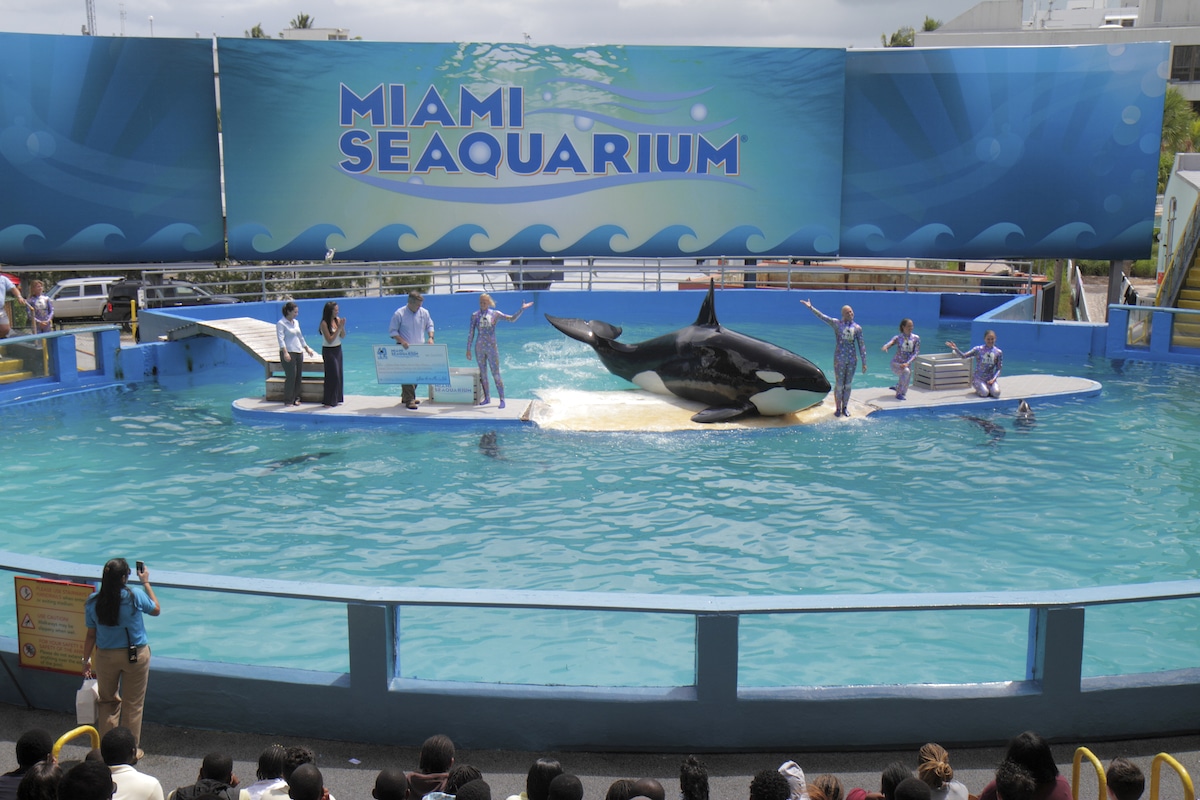Miami Aquarium to Release Tokitae/Lolita, an Orca Who Spent 50 Years in Captivity

 Why you can trust us
Why you can trust us
Founded in 2005 as an Ohio-based environmental newspaper, EcoWatch is a digital platform dedicated to publishing quality, science-based content on environmental issues, causes, and solutions.
Tokitae, a killer whale who has been in captivity for more than fifty years at the Miami Seaquarium, will be returning to her native waters in the Pacific Ocean’s Salish Sea.
Tokitae, who is also known as Lolita, is the oldest killer whale in captivity at 57. She is about 7,000 pounds and 20 feet long, but spends her life in a tank 80 feet long and 35 feet wide, which is the smallest tank in North America, according to a press release from nonprofit animal rights and rescue organization In Defense of Animals.
“I know she wants to get to free waters,” said Jim Irsay, a philanthropist and owner of the NFL football team the Indianapolis Colts, at a news conference yesterday, as The Guardian reported. “I don’t care what anyone says. She’s lived this long to have this opportunity.”
Irsay has agreed to help fund Tokitae’s homecoming, which could mean transporting her on a C-17 military plane or a 747, as well as the construction of a sanctuary in her native waters in the Pacific Northwest, reported The New York Times.
The plan is “a long-range commitment,” Irsay said, and Tokitae will have to relearn how to catch fish.
“She doesn’t know how to do that anymore. She’s been in captivity too long,” Irsay added, as The New York Times reported.
The Dolphin Company, which bought the Miami Seaquarium from Palace Entertainment, said the plan to release Tokitae was the result of an agreement between the company, nonprofit organization Friends of Lolita and Miami-Dade County, following years of pleas from animal rights organizations for Tokitae to be freed.
“It is a sacred privilege to share in the mission of caring for and bringing home Lolita, our beloved one,” said co-founder of Friends of Lolita Pritam Singh in a joint press release from Friends of Lolita, Irsay and the Miami Seaquarium.
Tokitae has now been “retired” from having to perform in a damaged pool filled with dirty water that may have caused the marine animals at the park to become injured and contract infections, according to a report by the United States Department of Agriculture Animal and Plant Health Inspection Service.
The report said the imprisoned killer whale was not being fed enough fish, leading her to have an inadequate intake of water. It also indicated that Toki and other marine animals at the park were being fed “poor-quality fish” that were at times partially decomposed.
“Toki… had been maintained on a fish diet of 160 pounds that was decreased to 130 pounds by the Training Curator, over the objection of the Attending Veterinarian,” the report said.
It is hoped that Tokitae will be able to make the journey to her home waters in the next 18 to 24 months, the joint press release said. Her most recent independent examination by veterinarians indicated that her health and daily activities were “becoming reasonably stable.”
Tokitae was first captured in 1970 after men with guns and sticks separated the mothers and calves of a group of resident killer whales in Penn Cove, Whidbey Island, in Washington State, reported The Guardian. More than 50 of the whales were taken captive to be put on display and at least a dozen of them died.
Tokitae is called Sk’aliCh’elh-tenaut by the members of the Lummi Nation, a name that refers to her membership in the Sk’aliCh’elh resident orca family who live in the Salish Sea. The Native American Tribe, who are the original inhabitants of Washington State’s northernmost coast, as well as southern British Columbia, see the killer whales as members of their extended family and have campaigned ceaselessly for Sk’aliCh’elh-tenaut’s release from captivity.
Some of Tokitae’s relatives, including the 94-year-old whale presumed to be her mother, are still alive, though today the endangered group consists of just 74 individuals.
“The story of Lolita the orca has been near and dear to my heart. I am proud — and enthusiastic — to play a role in finally returning Lolita to her native Pacific Northwest,” Irsay said in the joint press release.
Subscribe to get exclusive updates in our daily newsletter!
By signing up, you agree to the Terms of Use and Privacy Policy & to receive electronic communications from EcoWatch Media Group, which may include marketing promotions, advertisements and sponsored content.

 233k
233k  41k
41k  Subscribe
Subscribe 




